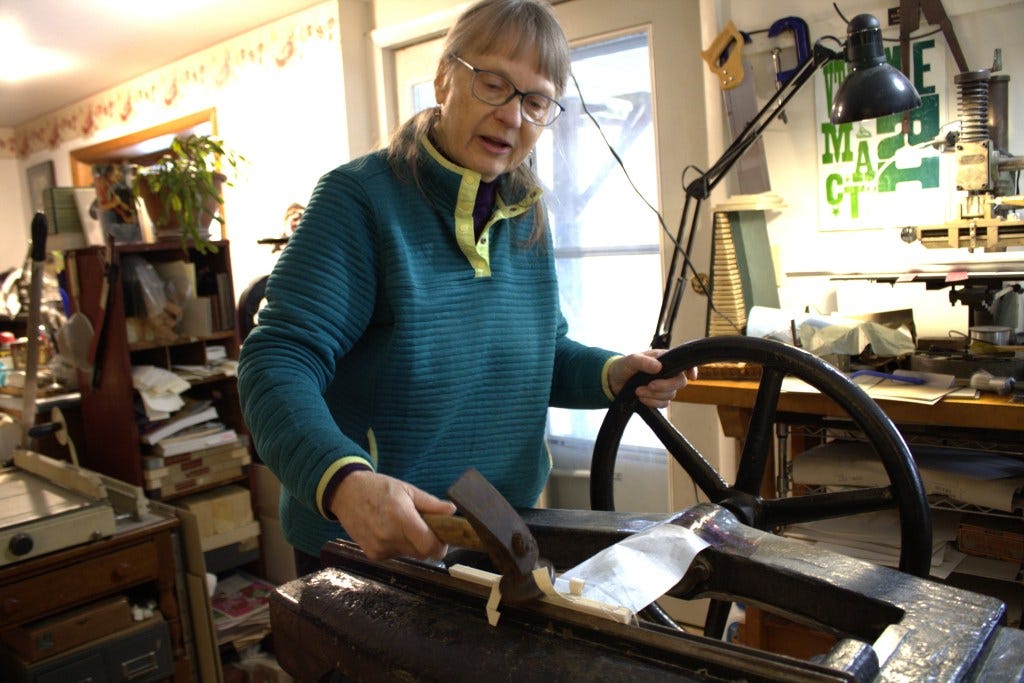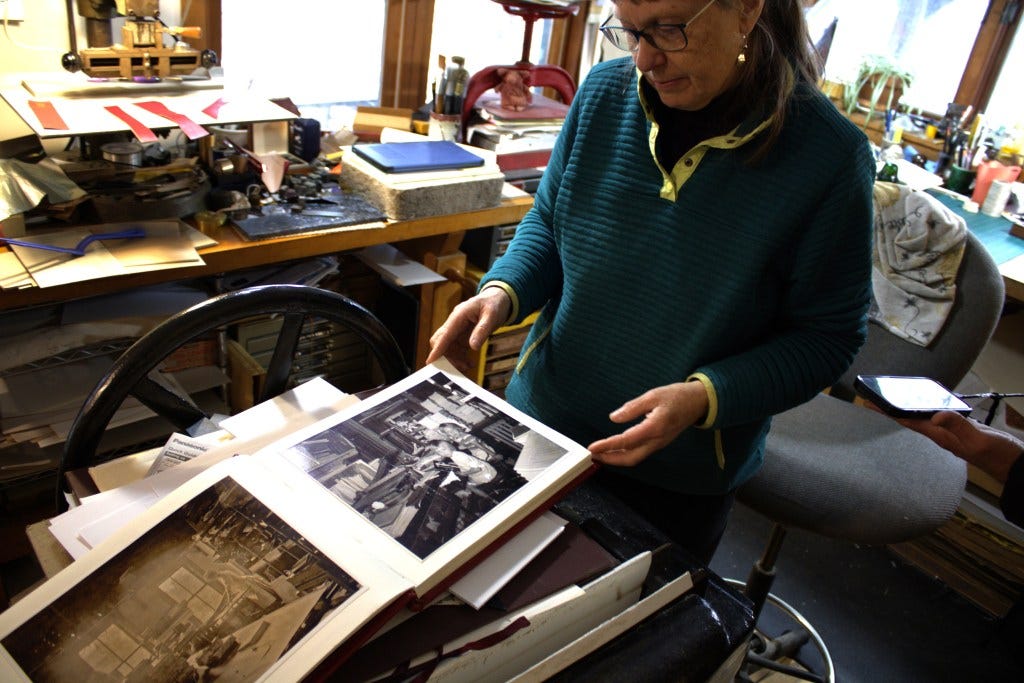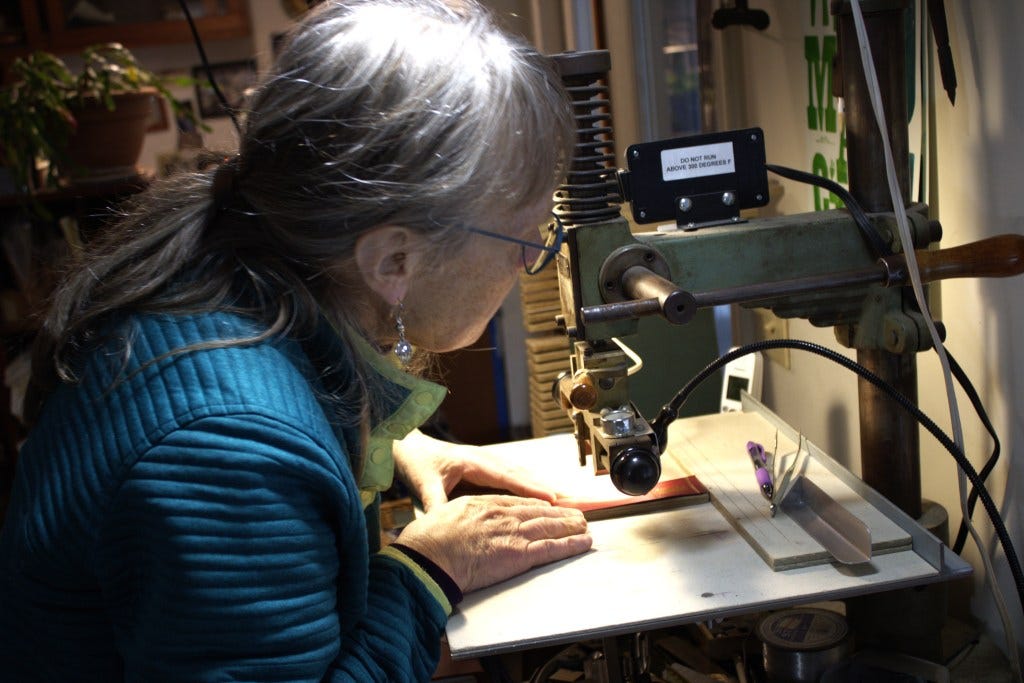Hinesburg family business binds books, memories and resistance
In a Vermont basement, a family tradition continues
By Ian Kreinsen
VT Community News Service
Marianna Holzer leafed through a carefully bound photo book that tells her family’s story.
On one side, her Swiss grandfather passed the bookbinding tradition on to his son, who passed it on to her.
On the other side, her German mother’s family resisted Adolf Hitler’s regime.
Today, Holzer and her husband, Rik Palieri, run the Holzer Book Bindery from their basement in Hinesburg.
For Holzer, bookbinding is more than just a business — it’s a bridge to the past and a way to safeguard a legacy of activism.
“Preserving books means preserving our history, so it all ties together,” she said.
Her Swiss grandfather, Ulrich Holzer, learned the trade in Italy. But during his time there, a wave of disease and anti-foreigner scapegoating forced him to flee.
He fled on a boat bound for the Holy Land, but when sickness broke out onboard, he was cast ashore along with the dead in Gibraltar. A passerby heard him crying for water, and he wound up on a different ship headed for Boston.
Without speaking English or having any documentation, he gravitated toward a community of Italian speakers, who helped him establish a book bindery in Hyde Park. His son Albert later took over the business. Marianna Holzer spent her early childhood in the shop.
When the bindery closed in the 1960s, the family ended up in Putney. Then, Albert Holzer died when Marianna was just 11.
Still, her mother understood the craft and helped pass it on to her daughter.
“She started in a walkout basement, like this,” she said, “binding books for friends. She taught me some basic things.”
Her mother, Christel Holzer, came from a family of Nazi resisters in Germany. At one point, soldiers burnt her grandfather’s books on his lawn. She believes that her aunt — a fierce anti-Nazi — was murdered for helping her husband escape from a concentration camp.
During that regime, Christel Holzer learned bookbinding as an act of resistance.
“She decided to go into something that maybe Hitler couldn’t twist around. So, she studied arts and crafts,” Marianna Holzer said. “While she was doing that, she learned bookbinding.”
After immigrating to America, Christel Holzer was hired by Albert Holzer’s bindery. The two later married.
Like Christel Holzer, musician Rik Palieri also got swept up in the Holzer family business.
When he and Marianna Holzer started dating, Palieri spent most of his spare time with her at the Brown River Bindery, where she worked before going independent.
“I realized I not only needed to be a musician, but I also had to help out to make this relationship work,” he said.
Today, Palieri is fully integrated into the bindery. Holzer handles the technical work — taking precise measurements and making repairs — while Palieri contributes to the artistic side of the trade.
Holzer converted her basement into a shop in 2008 and opened the binding business in 2010. Fifteen years later, tarnished tools, sheets of gold leaf and strips of leather clutter the workspace where she breathes new life into time-worn books.
Yet, her shop is not just a curious relic from the previous century. Business is booming.
“I don’t advertise,” she said. “But people keep finding me.”
Customers particularly turned out during the pandemic.
“People were going into their attics, finding old books and thinking, ‘We should do something with this.’ They’d call me up, and I’d meet them outside, even in the winter,” she said.
Holzer receives anything from used Bibles to cookbooks to beloved Harry Potter books. Often, they have notes scribbled in the margin, bits of food and wine stains.
“One of the weirder books I did was a mechanics manual from the sixties,” Palieri said. “It was all greasy, but it reminded him of working on cars with his father.”
“Most of the books I work on are not valuable,” Holzer said. “We’re more about sentimental value.”
Sentimentality extends beyond Holzer’s customers. Above her studio, she keeps a collection of professional books from her family and childhood, including a Brothers Grimm volume her father used to read to her as a child.
Next to her bookcase, she keeps a sign reading “resist.” Inspired by her mother, Holzer often attends protests and voices her opinions about the current presidential administration.
For Holzer, the bind between books, memory, resistance and human connection is clear.
“Books hold our history, hold information and enable people to imagine and see themselves as others when they feel isolated and alone,” she said.
Via Community News Service, a University of Vermont journalism internship program. This story originally appeared in The Citizen.




